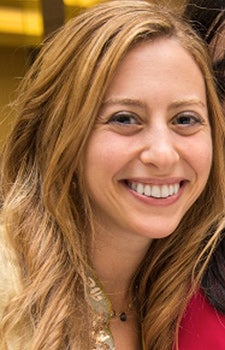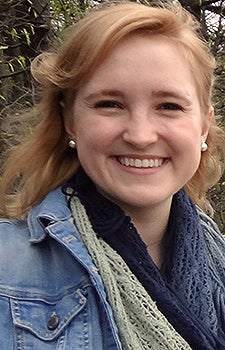Got English?
You think honing your writing skills prepares you solely for a writing career? Think again. For a wide range of industries, the most in-demand skill is writing.
That is coupled with good oral communication skills, according to a 2013 survey by the Chronicle of Higher Education and American Public Media’s Marketplace. The 2013 survey asked employers what top skills they sought in a job candidate freshly out of college.
At USC Dornsife, students in The Writing Program are well positioned to satisfy that demand, said John Holland, program director. The program’s chief goal is to teach students to write well while in school and into their careers.
“What we want to produce are students who have a strong foundation in writing, and who are flexible enough to adapt their skills to fit any communication responsibility in any setting,” Holland said.
One USC Dornsife alumna who went through the program is Amy Herrmann. She’s now an advocacy associate for Human Rights Watch in New York City. In 2012, Herrmann earned her bachelor’s in international relations with a minor in peace and conflict studies. The program helped prepare her for her many communications duties at the international human rights group.

As an advocacy associate for Human Rights Watch, USC Dornsife alumna Amy Herrmann draws upon the skills she learned in The Writing Program. Photo courtesy of Amy Herrmann.
She assists in drafting press releases and writing letters to heads of state and government. She also maintains webpages on the organization’s website, including written content. She communicates with staff members based throughout the world.
“Being able to communicate effectively, whether through reports, emails, telephone or Skype is essential in my position,” Herrmann said.
Geoffrey Middlebrook, professor (teaching) of writing, and director of the USC Dornsife Writing Center, a unit of The Writing Program providing one-on-instruction, said employers hire candidates who also have solid critical thinking skills and the ability to work in teams.
“In The Writing Program, we strive to provide these elements,” Middlebrook said.
In the program, undergraduates must take Writing 150, which offers courses such as “Issues in Sustainability,” “Technology and Social Change” and “Health and Healing.” The idea is to allow students to take a critical look at subjects that interest them while sharpening their writing abilities. Along with improving their grammar and writing style, students learn to analyze and argue their case.
Subsequently, students must complete Writing 340 in which they delve deeper into critical thinking, reading and writing. That course allows students to choose among five thematic areas — arts and humanities, health sciences, natural sciences, pre-law and social sciences. Plus, three special topics — advanced writing for communication and the public intellectual, international relations and global economics, and writing for visual and performing arts.
“In Writing 340, we really expect that students are developing into true authorities in their field,” Holland said. “We encourage students to read important journals in their major areas. We want them to think about how they can join in the conversation and contribute to the knowledge in their area of study.”
Herrmann said The Writing Program set her up for success.
“In my job it’s imperative to communicate clearly and concisely, whether it’s in a blog post or in an email, especially if my audience’s first language may not be English,” she said. “It’s a skill my undergraduate writing classes helped me to hone.”
In the program, Herrmann completed a course in contemporary moral and social issues and another in writing for digital environments.
“My writing classes gave me the foundation to start thinking about broader issues that are really central to human rights and the values inherent in my work,” she said.
Katherine Kelsh earned her bachelor’s in social sciences with an emphasis on economics from USC Dornsife in May 2014. The Writing Program had a profound effect on her career path.
As a junior, Kelsh took Writing 340 “Advanced Writing for Pre-Law Students” with James Brecher, professor (teaching) of writing.
“The class was focused on persuasive writing for legal issues, but the skills we learned have been applicable to all other writing I’ve done,” Kelsh said. “It made me a much more concise and direct writer. It also made me think of writing more as a puzzle in terms of how to choose the right pieces and get things to fit together.
“The class really sparked my interest and confirmed for me that I’m interested in law.”

Inspired by The Writing Program, USC Dornsife alumna Katherine Kelsh pursued a career as a law professor. Photo courtesy of Katherine Kelsh.
As a result, she took Brecher’s senior seminar in legal writing. In the course, Kelsh and her classmates tracked California Supreme Court cases, wrote model briefs based on those cases, then traveled to San Francisco to see the oral briefs presented in court.
“When we heard the arguments presented, they were very similar to the ones that we had written,” she said. “That was very cool to see and also very surprising.”
Kelsh said the program helped position her to eventually become a professor. She’d like to focus on privacy and cyber law. Her course work helped her to remember her writing audience and always add detail.
“I think the structure of my writing has become tighter,” she said. “I’m more focused for impact and more willing to play with words and see how they work out.”
Starting this Fall, Kelsh has been in Austria teaching English to high school students as part of the U.S. Teaching Assistantship program, administered by Fulbright. After a year, she plans to apply for law school. The Writing Program, she said, prepared her for the challenges that lie ahead.
“Having focused so intensely on crafting my writing skills will work to my advantage.”